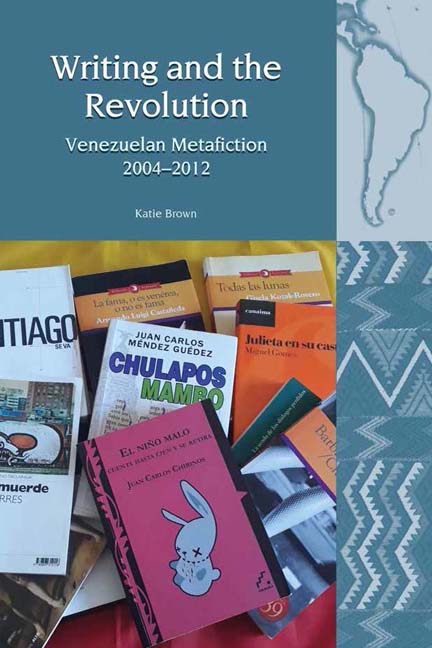1 - Writing for the State
Summary
Of the many ways in which authors comment on Bolivarian cultural policy in their fiction, the most explicit is through characters who work for the state as writers. This chapter examines how Chulapos Mambo (Méndez Guédez, 2011) and Bajo las hojas (Centeno, 2010) condemn the connections between a successful or unsuccessful writing career and Bolivarian politics. Juan Carlos Méndez Guédez's novel Chulapos Mambo(2011) parodies the Bolivarian approach to culture through the character of Henry, a talentless writer who is nonetheless promoted by the state thanks to his loyalty to the Revolution. Henry's self-delusion, fuelled by his determination to will himself into being a successful writer, is exacerbated by a cultural policy which celebrates everyone as a writer regardless of literary talent, or lack thereof. Henry is shown living the high life thanks to a government credit card in exchange for his loyalty to the party, embodying claims that writers are judged on their political orientation and activity, and criticism of the so-called ‘boliburguesía’ [Boli-bourgeoisie], those who have become rich through their support of the government (Valery, 2009b). In addition, the rivalry between Henry and the critically acclaimed but starving opposition writer Saúl Junco reflects the polarisation of the literary field under the Bolivarian Revolution. Israel Centeno's novel Bajo las hojas (2010) also explores what it means to write for the state, but through the lens of Julio, a struggling writer who takes a job writing for the government out of desperation. Julio's complaints reflect claims among writers that Bolivarian cultural policy has instrumentalised reading and delegitimised literary experimentation.
In Chulapos Mambo (2011), Juan Carlos Méndez Guédez parodies the literary system in Venezuela under Chávez. Henry Estrada, who thinks of himself as the saviour of Western literature, is presented as wholly unappealing: a fat, ugly drunk whose writing sends women to sleep. Henry, however, refers to himself repeatedly as a genius (17, 95, 188, 271) and even emails various publishers announcing:
YA ESTÁ AQUÍ.
LLEGÓ LA BOMBA. ESPERE LA EXPLOSIÓN QUE CAMBIARÁ
PARA SIEMPRE EL CURSO DE LA LITERATURA UNIVERSAL. (62)
[IT'S HERE.
THE BOMB HAS DROPPED. AWAIT THE EXPLOSION THAT
WILL CHANGE THE COURSE OF WORLD LITERATURE FOR
EVER.]
Henry's brash emails show how little he knows about the conventions of international literary markets. The absurd exaggeration of Henry's negative qualities juxtaposed with his inflated ego provides much of the humour of the novel.
- Type
- Chapter
- Information
- Writing and the RevolutionVenezuelan Metafiction 2004-2012, pp. 45 - 60Publisher: Liverpool University PressPrint publication year: 2019

